|
CHINA and the energy equation in ASIA: the determinants of policy choice/ Jean A. Garrison. London: First Forum Press, 2009
|

|
Abstract: Why does China act as it does in its pursuit of energy security? Are 'resource wars' inevitable? Going beyond traditional analysis that focus on China as a regional and global threat, Jean Garrison sheds new light on the roots of the country's energy policy and the constraints that it faces. Garrison eschews the zero-sum approaches that underlie much conceptualization of the subject, arguing that they are in large part based on the erroneous notion that China is a unitary actor with a coherent energy strategy.
|
|
China and the global politics of regionalization / Kavalski, Emilian, Ed. England: Ashgate Publishing, 2009
|

|
Abstract: This volume examines the prominent role of China in global politics and the relevance of the 'new regionalism' paradigm to China's international outreach. It provides a comprehensive and critical assessment of China's impact on the global politics of regionalization, offers a novel application of analytical models, investigates the aspects of the Chinese practice of regionalization that set it apart, and demonstrates China's transformative potential in international life.
|
| CHINA in Latin America: the what and wherefores / R. Evan Ellis. London: Lynne Rienner Publishers, 2009
|
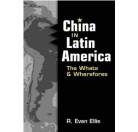
|
Abstract: AWith China on the minds of many in Latin America - from politicians and union leaders to people on the street, from business students to senior bankers - a number of important questions arise. Why, for example, is China so rapidly expanding its ties with the region? What is the nature of the new connection, and how will it affect institutions, economic structures, politics, and society? R. Evan Ellis provides a comprehensive look at the character and impact of the developing PRC - Latin America relationship.
|
|
CHINA rules: globalization and political transformation / Iian Alon, Julian Chang, Marc Fetscherin, and others, Ed. London: Palgrave Macmillan, 2009
|
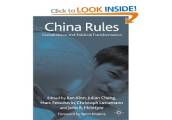
|
Abstract: As part of a serious and valuable effort to explore "China going global," this timely book collects rich information and enlightening analyses on China's epic entry into the global market and the profound impact of that process on the world and on China itself. The many authors from around the world gathered here offer a great deal about the internationalization of Chinese enterprises and business practices as well as the emerging Chinese rules and activities that the world is increasingly reckoning with." -- Fei-Ling Wang, Professor of International Affairs, Georgia Institute of Technology
|
|
CHINA: the rising power / Gunther Hauser and Franz Kernic, Ed. Berlin: Peter Lang, 2009
|
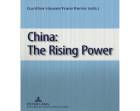
|
|
|
The Chinese communist party as organizational emperor: culture, reproduction and transformation / Zheng Yongnian. London: Routledge, 2010
|
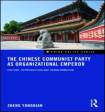
|
Abstract: The Chinese Communist Party (CCP) is the largest and one of the most powerful, political organizations in the world today, which has played a crucial role in initiating most of the major reforms of the past three decades in China. China's rapid rise has enabled the CCP to extend its influence throughout the globe, but the West remains uncertain whether the CCP will survive China's ongoing socio-economic transformation and become a democratic country.
|
|
Chinese policing: history and reform / Kam C. Wong. New York: Peter Lang, 2009
|
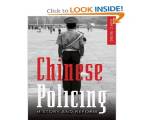
|
Abstract: This book documents a systematic investigation into various aspects of policing in the Peoples Republic of China, including its scholarship, idea, origin, history, education, culture, reform, and theory. It approaches the study of Chinese policing from an indigenous perspective, informed by local empirical data. In proposing an innovative theory of community policing entitled Police Power as a Social Resource Theory, the book seeks to look at crime as a personal problem, and police as a social resource, from the perspective of the people and not the state.
|
|
Chinese security policy: structure, power and politics / Robert S. Ross. London: Routledge, 2010
|
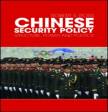
|
Abstract: Chinese Security Policy covers such fundamental areas as the role of international structure in state behavior, the use of force in international politics (including deterrence, coercive diplomacy, and war), and the sources of great-power conflict and cooperation and balance of power politics, with a recent focus on international power transitions. The research integrates the realist literature with key issues in Chinese foreign policy, thereby placing China's behaviour in the larger context of the international political system.
|
|
Civil-military relations in today's CHINA: swimming in a new sea / Finkelstein, David M., Ed. New Delhi: Pentagon Press, 2009
|
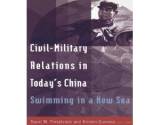
|
Abstract: This work provides an in-depth and up-to-date examination of civil-military relations in China. It reflects the significant changes taking place in Chinese society and their impact on the civil-military dynamic, with particular attention to how the military will fit in with the new class of entrepreneurs. Rather than focusing exclusively on elite Party-Army relations, the book examines civil-military relations from various vantage points: at "the center" and in the provinces; between civilian leaders and military leaders; from a strictly military perspective and from a civilian perspective; and from the angle of specific issue areas
|
| Civil rights in wartime: the post-9/11 sikh experience / Dawinder S. Sidhu and Neha Singh Gohil. England: Ashgate Publishing Limited, 2009
|
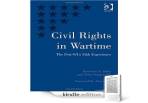
|
Abstract: In the days, months, and now years following the events of September 11th, discrimination against the Sikh community in America has escalated sharply, due in part to a populace that often confuses Sikhs, compelled by their faith to wear turbans, with the Muslim extremists responsible for the devastating terrorist attacks. Although Sikhs have since mobilized to spread awareness and condemn violence against themselves and Muslims, there has been a conspicuous absence of academic literature to aid scholars and commentators in understanding the effect of the backlash on the Sikh community, the group disproportionately impacted by post-9/11 discrimination.
|
|
Climate, affluence, and culture / Evert Van de Vliert. New York: Cambridge University Press, 2009
|

|
Abstract: Everyone, everyday, everywhere has to cope with climatic cold or heat to satisfy survival needs, using money. This point of departure led to a decade of innovative research on the basis of the tenet that climate and affluence influence each other's impact on culture. Evert Van de Vliert discovered survival cultures in poor countries with demanding cold or hot climates, self-expression cultures in rich countries with demanding cold or hot climates, and easygoing cultures in poor and rich countries with temperate climates.
|
|
Climate change and armed conflict: hot and cold wars / James R. Lee. London: Routledge, 2009
|
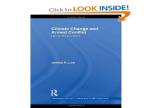
|
Abstract: This book examines the evolution of the relationship between climate change and conflict, and attempts to visualize future trends. Owing to the accumulation of greenhouse gases in the atmosphere, current trends in climate change will not appreciably alter over the next half century even if drastic action is taken now. Changes in climate will produce unique types and modes of conflict, redefine the value of important resources, and create new challenges to maintaining social order and stability. This book examines the consequences of climate change and argues that it has and will produce two types of different types of conflict: 'cold wars' and 'hot wars'.
|
|
Climate change in ASIA: perspectives on the future climate regime / Yasuko Kameyama, Agus P. Sari, Moekti H. Soejachmoen and Nor. Tokyo: United Nations University Press, 2009
|

|
Abstract: Today the organization of science is undergoing a fundamental transformation. In The New Invisible College, Caroline Wagner combines quantitative data and extensive interviews to map the emergence of global science networks and trace the dynamics driving their growth. She argues that the shift from big science to global networks creates unprecedented opportunities for developing countries to tap science s potential. Rather than squander resources in vain efforts to mimic the scientific establishments of the twentieth century, developing country governments can leverage networks by creating incentives for top-notch scientists to focus on research that addresses their concerns and by finding ways to tie knowledge to local problem solving.
|
|
Climate change: observed impacts on planet earth / Letcher, Trevor M., Ed.Amsterdam: Elsevier, 2009
|
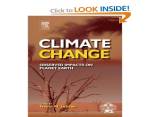
|
Abstract: The climate of the Earth is always changing. As the debate over the implications of changes in the Earth's climate has grown, the term climate change has come to refer primarily to changes we've seen over recent years and those which are predicted to be coming, mainly as a result of human behavior. This book serves as a broad, accessible guide to the science behind this often political and heated debate by providing scientific detail and evidence in language that is clear to both the non-specialist and the serious student.
|
|
The Clinton tapes: wrestling history with the president / Taylor Branch. London: Simon and Schuster, 2009
|

|
Abstract:This book rests upon a secret project, initiated by Clinton, to preserve for future historians an unfiltered record of presidential experience. During his eight years in office, between 1993 and 2001, Clinton answered questions and told stories in the White House, usually late at night. His friend Pulitzer Prize-winning author Taylor Branch recorded seventy-nine of these dialogues to compile a trove of raw information about a presidency as it happened. Clinton drew upon the diary transcripts for his memoir in 2004.
|
|
The collected what if?: eminent historians imagining what might have been / Robert Cowley, Ed. New York: Penguin Group, 2001
|

|
|
|
A concise history of modern KOREA: from the late nineteenth century to the present / Michael J. Seth. Lanham: Rowman & Littlefield Publishers, Inc., 2010
|

|
Abstract: This comprehensive and balanced history of modern Korea explores the social, economic, and political issues it has faced since being catapulted into the wider world at the end of the nineteenth century. Placing this formerly insular society in a global context, Michael J. Seth describes how this ancient, culturally and ethnically homogeneous society first fell victim to Japanese imperialist expansionism, and then was arbitrarily divided in half after World War II.
|
| Conflict management and resolution: an introduction / Ho-Won Jeong. London: Routledge, 2010
|

|
Abstract: It examines how to prevent, manage and eventually resolve various types of conflict that originate from inter-state and inter-group competition, and expands the existing scope of conflict management and resolution theories by examining emerging theories on the identity, power and structural dimensions of adversarial relationships. The volume is designed to enhance our understanding of effective response strategies to conflict in multiple social settings as well as violent struggles, and utilizes numerous case studies, both past and current
|
|
Confronting terrorism / Maroof Raza, Ed. New Delhi: Penguin Group, 2009
|
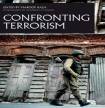
|
Abstract: The attacks on Mumbai on 26 November 2008 brought home to Indians the full horror of terrorism. It also brought home, quite literally, the change in the contemporary face of war. War today is no longer confined to battle fields; it is right here. How is India equipped to deal with this menace which has been described as an 'ultramodern, and a very traditional, conspiracy'?
|
| Confronting the bomb: a short history of the world nuclear disarmament movement / Lawrence S. Wittner. Stanford: Stanford University Press, 2009
|

|
Abstract: Confronting the Bomb tells the dramatic, inspiring story of how citizen activism helped curb the nuclear arms race and prevent nuclear war. This abbreviated version of Lawrence Wittner's award-winning trilogy, The Struggle Against the Bomb, shows how a worldwide, grassroots campaign-the largest social movement of modern times-challenged the nuclear priorities of the great powers and, ultimately, thwarted their nuclear ambitions. Based on massive research in the files of peace and disarmament organizations and in formerly top secret government records, extensive interviews with antinuclear activists and government officials, and memoirs and other published materials, Confronting the Bomb opens a unique window on one of the most important issues of the modern era: survival in the nuclear age.
|
| Congress of the U.S.: commitees, rules and procedures / Sela G. Thomason, Ed. New York: Nova Science Publishers, Inc., 2009
|

|
|